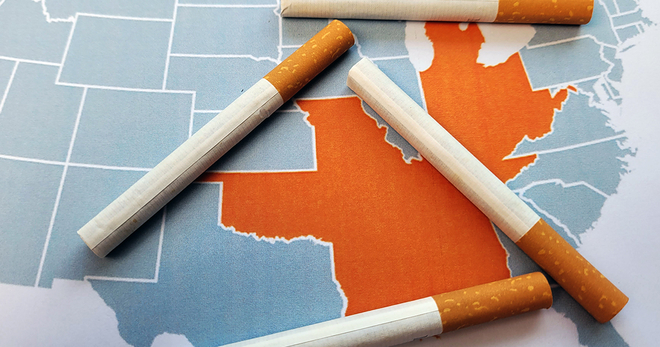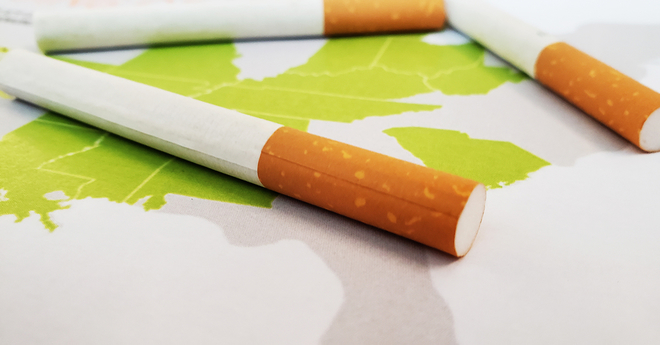Tobacco use in New Jersey 2020
Cigarette use: New Jersey
Cigarette smoking rates in New Jersey
- In 2018, 13.1% of adults smoked. Nationally, the rate was 16.1%.1
- In 2019, 3.8% of high school students in New Jersey smoked cigarettes on at least one day in the past 30 days. Nationally, the rate was 6.0%.2
Other tobacco product use: New Jersey
Vaping rates in New Jersey
- In 2017, 4.4% of adults in New Jersey used e-cigarettes.3
- In 2018, 1.4% of adults in New Jersey used smokeless tobacco.3
- In 2019, 27.6% of high school students in New Jersey used electronic vapor products on at least one day in the past 30 days. Nationally, the rate was 32.7%.2
Economics of tobacco use and tobacco control
How much does New Jersey get from tobacco taxes
- New Jersey received $879.4 million (estimated) in revenue from tobacco settlement payments and taxes in fiscal year 2020.4
- Of this, the state allocated $7.2 million in state funds to tobacco prevention in fiscal year 2020, 6.9% of the Centers for Disease Control and Prevention’s annual spending target.4
- Smoking-caused health care costs: $4.06 billion per year.4
- Smoking-caused losses in productivity: $3.15 billion per year.5
New Jersey tobacco laws
New Jersey cigarette tax
Tobacco taxes
- New Jersey is ranked 12th in the U.S. for its cigarette tax of $2.70 per pack (enacted July 2009), compared to the national average of $1.82. (The District of Columbia has the highest tax at $4.50 and Missouri has the lowest at 17 cents.)6-8
- Moist snuff is taxed at 75 cents per ounce. All other tobacco products are taxed at 30% of the wholesale price.6
Clean indoor air ordinances
- Smoking is prohibited in all government workplaces, private workplaces, schools, childcare facilities, restaurants, bars (allowed in cigar bars/lounges), retail stores and recreational/cultural facilities.6,7
- Smoking is prohibited in indoor areas of horse tracks. Atlantic City has an ordinance restricting smoking to 25% of the gaming floors of casinos.6,7
- E-cigarettes is included in the state’s definition of smoking.9
- Children’s Group Homes must prohibit use of electronic smoking devices by children and staff sale/distribution of such devices to children.9
- Use of electronic cigarettes prohibited in Atlantic City International Airport similar to smoking.9
Flavor restrictions
- The sale of all flavored vapor products is prohibited.10
Licensing laws
- Retailers and wholesalers are required to obtain a license to sell tobacco products.6
- A license is not required to sell e-cigarettes.9
Point of sale laws
- Retailers are prohibited from using coupons, price reductions, and rebates related to the sale of all tobacco products, including e-cigarettes.11
Youth access laws
- In December 2019, the United States adopted a law raising the federal minimum age of sale of all tobacco products to 21, effective immediately.
- Establishments are required to post signs stating that sales to minors are prohibited and those who sell tobacco products to those under 21 will be fined and could face suspension or revocation of their tobacco license. The sign must also state that proof of age may be required for purchase of tobacco products.6
Local tobacco laws
- Hanover Township prohibits the sale of all e-cigarettes.10
- Jersey City prohibits the sale of all flavored e-cigarettes.10
- Westfield restricts the sale of e-cigarettes to licensed adult-only retail establishments that do not hold a retail food establishment license, a license for the retail sale of motor fuel, or a liquor license.10
Quitting statistics and benefits
Quitting smoking and vaping in New Jersey
- The CDC estimates 56.1% of daily adult smokers in New Jersey quit smoking for one or more days in 2018.3
- In 2014, the Affordable Care Act required that Medicaid programs cover all tobacco cessation medications.7**
- New Jersey’s state quit line invests $2.87 (there is no new data reported) per smoker, compared to the national average of $2.14.7
- New Jersey has a private insurance mandate provision for cessation.7
Notes and references
Updated August 2020
*National and state-level prevalence numbers reflect the most recent data available. This may differ across state fact sheets.
**The seven recommended cessation medications are NRT gum, NRT patch, NRT nasal spray, NRT inhaler, NRT lozenge, Varenicline (Chantix) and Bupropion (Zyban).
Fiore MC, et al. Treating Tobacco Use and Dependence: 2008 Update. Clinical Practice Guideline. Rockville, MD: US Department of Health and Human Services. Public Health Service: May 2008.
1. CDC, Behavioral Risk Factor Surveillance System, 2018.
2. CDC, Youth Risk Behavioral Surveillance System, 2019.
3. CDC, Behavioral Risk Factor Surveillance System, State Tobacco Activities Tracking and Evaluation System, 2020.
4. Campaign for Tobacco-Free Kids, Broken Promises to Our Children: a State-by-State Look at the 1998 State Tobacco Settlement 21 Years Later FY2020, 2019.
5. Campaign for Tobacco-Free Kids, Toll of Tobacco in the United States.
6. American Lung Association, State Legislated Actions on Tobacco Issues (SLATI).
7. American Lung Association, State of Tobacco Control, 2020.
8. Campaign for Tobacco-Free Kids. State Cigarette Excise Tax Rates & Rankings. https://www.tobaccofreekids.org/assets/factsheets/0097.pdf. Accessed.
9. Public Health Law Center. U.S. E-Cigarette Regulation: 50-State Review. http://www.publichealthlawcenter.org/resources/us-e-cigarette-regulations-50-state-review. Accessed.
10. Truth Initiative, Local restrictions on flavored tobacco and e-cigarette products. https://truthinitiative.org/research-resources/emerging-tobacco-products/local-restrictions-flavored-tobacco-and-e-cigarette.
11. New Jersey Department of the Treasury. Notice: Cigarette/Tobacco & Vapor Products Tax - Prohibited Use of Coupons, Price Reduction Promotions & Price Rebates. https://www.state.nj.us/treasury/taxation/cigcoupons.shtml. Published 2020. Accessed.
More in smoking by region
Want support quitting? Join EX Program
By clicking JOIN, you agree to the Terms, Text Message Terms and Privacy Policy.
Msg&Data rates may apply; msgs are automated.






